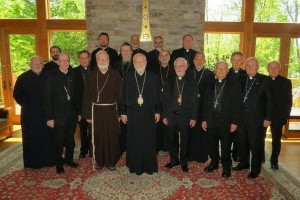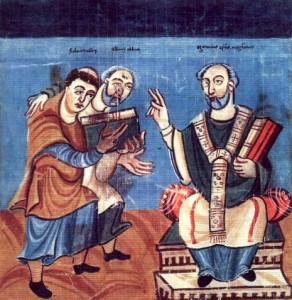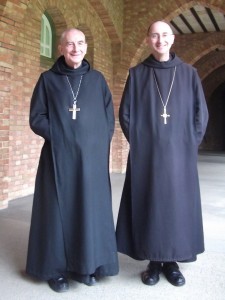“When Elizabeth heard Mary’s greeting,
the infant leaped in her womb,
and Elizabeth, filled with the Holy Spirit,
cried out in a loud voice and said,
“Most blessed are you among women,
and blessed is the fruit of your womb.
And how does this happen to me,
that the mother of my Lord should come to me?
For at the moment the sound of your greeting reached my ears,
the infant in my womb leaped for joy.
Blessed are you who believed
that what was spoken to you by the Lord
would be fulfilled.”
Corpus Christi
 On this Solemnity of Corpus Christi (the Body and Blood of Chris) a reflection from St. John Chrysostom is good to consider:
On this Solemnity of Corpus Christi (the Body and Blood of Chris) a reflection from St. John Chrysostom is good to consider:
“Since we are talking about the Body, know that we, as many of us as partake of the Body, as many as partake of that Blood, we partake of something which is in no way different or separate from that which is enthroned on high, which is adored by the angels, which is next to Uncorrupt Power.”
Looking more deeply into St Philip Neri
The other day (May 25) we had the liturgical memorial of the great Italian saint, Philip Neri. He is indeed an under appreciated saint of the Church. Neri can’t be white-washed nor can be merely imitated in a blind way. We need to encounter Neri on his own terms. Some want to make him a patron saint of the new evangelization, others like Elizabeth Scalia see St Philip in the pastoral work of Pope Francis. Like other saints of great import, Neri needs to be taken up and explored more deeply for his pastoral approach to ecclesial life, his preaching, his life of sanctity, and his ideas as founder of the Oratory, not for any such novelty that may or may not exist. This last point on the Oratory needs to be teased out since we are now seeing the founding of more Oratories in the USA (England has a rise in Oratorian life).
While I disagree with Elizabeth Scalia’s idea that His Holiness imitates Neri or that we can see Neri in the work of Francis, I do think her essay warrants a more serious look on Neri for ecclesial life in the USA.
Monks beat Taylor Swift
 If you can imagine the headline that “Monks beat Taylor Swift” in record sales, then you know Church tradition is right. Music sales of chant always seem to do well. The chant has a transcendent quality which makes the music quite attractive. I know non-Christian people listen to chant because it puts them in a peaceful “zone”.
If you can imagine the headline that “Monks beat Taylor Swift” in record sales, then you know Church tradition is right. Music sales of chant always seem to do well. The chant has a transcendent quality which makes the music quite attractive. I know non-Christian people listen to chant because it puts them in a peaceful “zone”.Joint Committee of Orthodox-Catholic Bishops 2016
Saint Dunstan
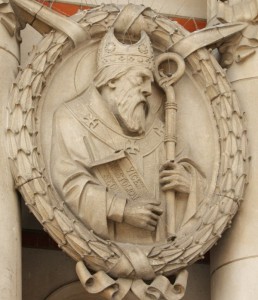 Also on this date, the Benedictines recall the holy life of Saint Dunstan. Today’s Benedictine saint is very much revered by the Catholics of England –read up on him here.
Also on this date, the Benedictines recall the holy life of Saint Dunstan. Today’s Benedictine saint is very much revered by the Catholics of England –read up on him here.
“St Dunstan, as the story goes,
Once pull’d the devil by the nose
With red-hot tongs, which made him roar,
That he was heard three miles or more.”
(The Every-Day Book)
image by Fr Lawrence Lew, OP
Blessed Alcuin
The Benedictines remember today Blessed Alcuin of York who was born c. 735; died at Saint Martin’s in Tours, France, May 19, 804. Due to his education and experience in certain human matters, when Alcuin Charlemagne he impressed the emperor so much that he became his adviser. Alcuin was appointed abbot of Saint Martin’s Abbey at Tours (France) in 796 by Charlemagne. At Tours, with Saint Benedict of Aniane, he restored the monastic observance.
Toward the end of his life Alcuin said this of his own career with a rather beautiful description:
In the morning, at the height of my powers, I sowed the seed in Britain, now in the evening when my blood is growing cold I am still sowing in France, hoping both will grow, by the grace of God, giving some the honey of the holy scriptures, making others drunk on the old wine of ancient learning…
Dom Xavier Perrin as Abbot of Quarr
Great news from Quarr Abbey! A new abbot has been elected. The Abbey is part of the Solesmes Congregation.
Dom Xavier Perrin has been elected as Abbot of Quarr Abbey, the Benedictine Abbey on the Isle of Wight. The election took place on Wednesday, May 11, 2016.
Fr Xavier Perrin, born in Tours in 1958, first studied French Literature in Rennes, and then History of Art at the Sorbonne. In 1980, he entered the Abbey of Sainte Anne de Kergonan, a monastery founded by Solesmes in South Brittany in 1897. He studied theology first at Solesmes, then at Fribourg in Switzerland, and finally in Munich. After his ordination in 1989, he took charge of the guesthouse, while teaching dogmatic theology and playing the organ. He was novice master from 1993 to 2010, choir master from 1996 to 2013, and prior from 2002 to 2013. He has written books and articles about the history of the Solesmes Congregation, liturgy, and spirituality. He has been involved in the promotion of Gregorian Chant through several week-ends, concerts and CDs. He was appointed Prior Administrator of Quarr Abbey (Isle of Wight) in April 2013.
He said, “I entrust my abbatial ministry to Our Lady of Quarr. I hope and pray that Quarr can continue to give its unique contribution to the Catholic Church in Britain, and be a beacon of light for the many visitors to the Isle of Wight.”
The picture: Abbot Xavier (on the right) standing next to Abbot Philippe Dupont, Abbot President of the Solesmes Congregation.
Pentecost
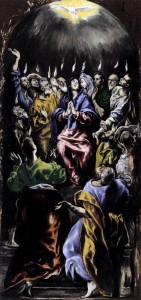 In fact, the paschal mystery — the passion, death and resurrection of Christ and his ascension into Heaven — finds its fulfillment in the powerful outpouring of the Holy Spirit on the Apostles gathered together with Mary, Mother of the Lord, and the other disciples. It was the “baptism” of the Church, baptism in the Holy Spirit (cf. Acts 1:5)… God’s voice divinized the human language of the Apostles who were enabled to proclaim the one divine Word in a “polyphonic” manner. The breath of the Holy Spirit fills the universe, generates faith, leads to truth, and predisposes people to unity…The Holy Spirit, “who is the Lord and Giver of life” — as we say in the Creed — is joined to the Father through the Son and completes the revelation of the Blessed Trinity. He comes from God like a breath from his mouth and has the power of sanctifying, abolishing divisions, dispelling the confusion due to sin. Incorporeal and immaterial, he lavishes divine goods upon living beings and sustains them so that they may act in conformity with the good. As an intelligible Light he gives meaning to prayer, vigor to the evangelizing mission, he makes the hearts of those who listen to the happy message burn and inspires Christian art and liturgical music.
In fact, the paschal mystery — the passion, death and resurrection of Christ and his ascension into Heaven — finds its fulfillment in the powerful outpouring of the Holy Spirit on the Apostles gathered together with Mary, Mother of the Lord, and the other disciples. It was the “baptism” of the Church, baptism in the Holy Spirit (cf. Acts 1:5)… God’s voice divinized the human language of the Apostles who were enabled to proclaim the one divine Word in a “polyphonic” manner. The breath of the Holy Spirit fills the universe, generates faith, leads to truth, and predisposes people to unity…The Holy Spirit, “who is the Lord and Giver of life” — as we say in the Creed — is joined to the Father through the Son and completes the revelation of the Blessed Trinity. He comes from God like a breath from his mouth and has the power of sanctifying, abolishing divisions, dispelling the confusion due to sin. Incorporeal and immaterial, he lavishes divine goods upon living beings and sustains them so that they may act in conformity with the good. As an intelligible Light he gives meaning to prayer, vigor to the evangelizing mission, he makes the hearts of those who listen to the happy message burn and inspires Christian art and liturgical music.
Pentecost
Benedict XVI
Regina Caeli Address, June 12, 2011
Because the Holy Spirit charges the world
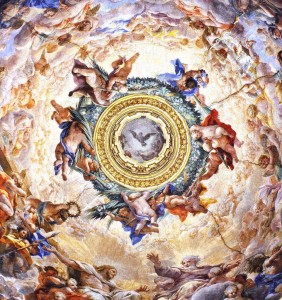 THE WORLD is charged with the grandeur of God.
THE WORLD is charged with the grandeur of God.
It will flame out, like shining from shook foil;
It gathers to a greatness, like the ooze of oil
Crushed. Why do men then now not reck his rod?
Generations have trod, have trod, have trod;
And all is seared with trade; bleared, smeared with toil;
And wears man’s smudge and shares man’s smell: the soil
Is bare now, nor can foot feel, being shod.
And for all this, nature is never spent;
There lives the dearest freshness deep down things;
And though the last lights off the black West went
Oh, morning, at the brown brink eastward, springs—
Because the Holy Ghost over the bent
World broods with warm breast and with ah! bright wings.
“God’s Grandeur”
Gerard Manley Hopkins

